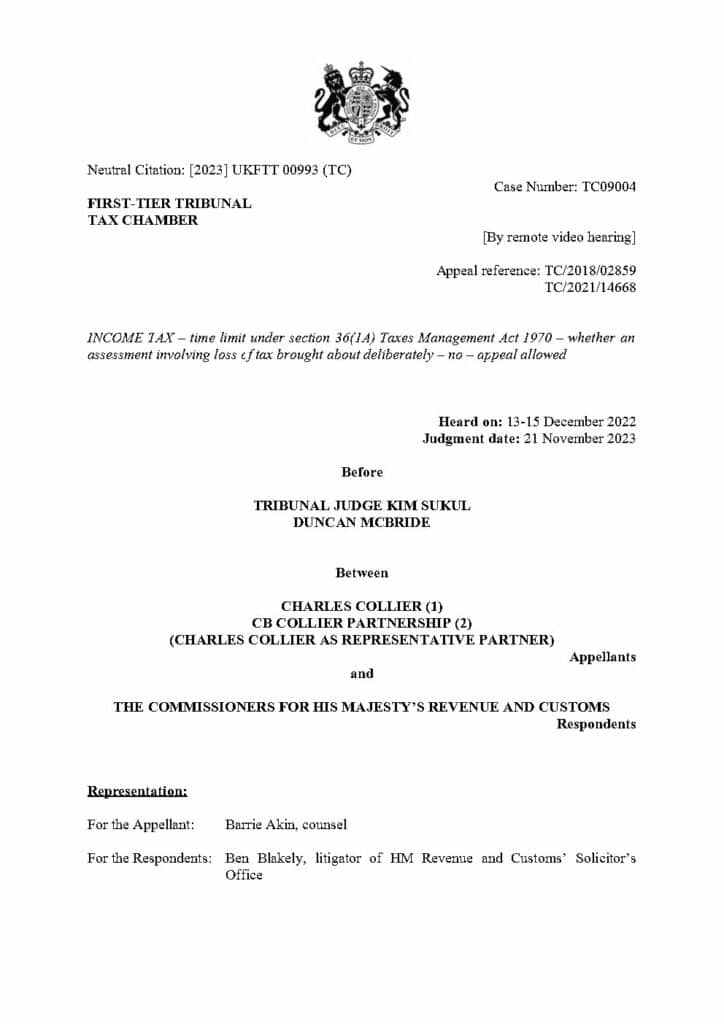In the case of Charles Collier and others v HMRC [2023] UKFTT 00993 (TC), the First-tier Tribunal (FTT) examined the impact of dyslexia on a taxpayer’s ability to comply with tax obligations. The decision sheds light on the complexities surrounding deliberate behaviour in tax assessments and the role of disabilities in such circumstances.
HMRC’s Power to Raise Assessments
HMRC’s power to make discovery assessments is governed by specific conditions, including time limits. Deliberate errors, resulting in extended time limits for assessment, are defined by the intention of the taxpayer to provide inaccurate information knowingly. This subjective test includes scenarios where taxpayers display “blind-eye” knowledge or recklessness. In the case at hand, Mr. Collier, the individual taxpayer, and his partnership faced assessments by HMRC due to errors in their tax returns.
Dyslexia and Reliance on Accountants
Mr. Collier’s diagnosis of dyslexia, coupled with a reading age of 12 years, significantly impacted his ability to independently review tax returns. Relying heavily on the services of a trusted accountant for tax compliance, Mr. Collier’s situation changed when personal tragedy led to a decline in his accountant’s performance, resulting in erroneous submissions.
First-tier Tax Tribunal’s Decision
HMRC alleged deliberate behaviour on Mr. Collier’s part, contending that he should have been aware of the errors in his returns. However, the FTT ruled in favour of Mr. Collier, emphasising the lack of reliable evidence to support HMRC’s claims of deliberate conduct. The tribunal considered Mr. Collier’s dyslexia diagnosis and the significance of the omitted amounts, ultimately concluding that the errors stemmed from carelessness rather than deliberate action.
During the proceedings, the FTT heard testimonies from various witnesses, including Mr. Collier, Ms. Topham, Mr. King, and Mr. Baines. While the tribunal found Mr. Collier and his associates credible, it deemed HMRC’s evidence of limited value, particularly due to the absence of direct involvement from Mr. Baines in the initial inquiries.
Subsequently, the FTT made key factual findings, emphasising Mr. Collier’s dyslexia diagnosis, his reliance on trusted professionals for tax matters, and the decline in the accountant’s work standards following a personal tragedy.
Deliberate Conduct and Conclusion
The pivotal question before the FTT focused on whether the assessed loss of tax resulted from deliberate actions. Relying on legal precedents and subjective tests, the tribunal scrutinised Mr. Collier’s intentions in providing tax documents to HMRC. Despite HMRC’s arguments, the FTT determined that Mr. Collier did not knowingly cause the tax loss and had not exhibited blind-eye knowledge or recklessness.
Ultimately, HMRC failed to discharge its burden of proof, leading to the invalidation of the assessments and amendments. Consequently, associated penalty assessments and determinations were also deemed invalid by the tribunal
Download the Judgment Here
HMRC Tax Disputes Lawyers
Understanding the nuances of tax compliance, especially in cases involving disabilities, requires expert legal guidance. LEXLAW specialises in providing comprehensive assistance to taxpayers facing challenges in tax assessments. Whether it’s navigating complex legal frameworks, advocating for fair treatment, or defending against allegations of deliberate behaviour, our experienced team is dedicated to safeguarding your rights and interests.
In conclusion, the case of Charles Collier highlights the importance of recognising the impact of disabilities on tax compliance. While taxpayers are responsible for ensuring the accuracy of their returns, mitigating circumstances such as dyslexia should be taken into account. With LEXLAW‘s support, taxpayers can navigate the intricacies of tax law with confidence and advocate for fair treatment in legal proceedings.
Want legal advice from Tax Solicitors on your case?
Our simple enquiry form goes immediately to our tax litigators in Middle Temple, London. Call us on +442071830529 from 9am-6pm.
Expert London Tax Lawyers
If you need HMRC Tax Disputes advice, we are available to aid you at every stage of the HMRC appeals process. Members of our legal team have first-hand experience and working knowledge of the internal workings of HMRC. We can provide you with the very best representation in negotiations, throughout the HMRC internal review process and in front of the Tax Tribunal. Our team specialises in successfully challenging HMRC decisions and will assist you in every aspect including developing a strategy.
We are experts in adeptly presenting evidence and employing bespoke arguments combining the facts of your case, previous cases and current legislation to ensure your appeal is a successful one. We provide urgent advice and representation to clients from our unique expert team of established tax and duties specialist solicitors and barristers with a proven track record of delivering authoritative results. Just call us on 0207 1830 529, or email [email protected].
HMRC APPEAL DEADLINES – WARNING
HMRC decision letters containing penalties or imposing assessments offer time limited deadlines within which to appeal. Often these short deadlines (e.g. 30 days) can run from the date of the letter which means you have less time than you think. Your legal rights will become irreversibly time-barred if you fail to take legal action. Therefore, you should seek specific legal advice about your HMRC tax dispute at the very first opportunity so that you understand the time you have left. Failure to take advice or delay in taking action can be fatal to your prospects of success.

